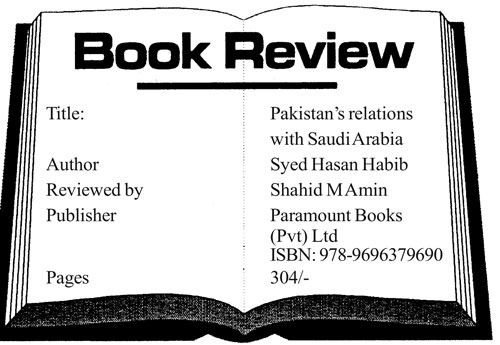THIS book which is a hard work of five years by Pakistan’s former Ambassador to Saudi Arabia should be an essential read for all those who want to follow the contours of this simple yet deep relationship.
Ambassador Shahid Amin takes us through the fascinating journey through the language of a diplomat and the skills of a storyteller.
Ambassador Shahid Amin had dealt with Saudi Arabia in Pakistan Foreign Office in various capacities and also as Ambassador to the Kingdom. In his very lucid and first-hand narrative, he charts the development of relations through their ups and downs.
The special relationship that was established since Pakistan’s independence grew steadily. Its nature also changed from submissively supportive to the current level of not so friendly.
In several regional events independent positions were taken by Pakistan especially in Yemen, Iran and Syria has taken Saudi Arabia by surprise. There is a need for great consultation between the two or to rethink the friendship.
Ambassador Amin looks at the relationship through foreign policy development and the ever-changing realities especially the US enhanced interest in the Middle East. Pakistan’s changing political scenario also greatly impacts the friendship.
Our politicians looked consistently to the Kingdom for financial support for Pakistan which most of the time was made available. So Saudi Arabia become our best supporter in time of need and adopted the role of big brother.
In return, Pakistan became the guarantor of Saudi security (against internal and external threats) by posting its troops in the Kingdom.
Pakistan labour was already there in large number working in developmental projects. Shahid Amin then went on to show how our political leaders increasingly became dependent upon Saudi support.
Saudi efforts to protect Bhutto and Nawaz Sharif did not fully pay off for the benefit of the Kingdom’s rulers. The chapters dealing with eras of Prime Ministers Bhutto and Muhammad Nawaz Sharif are glaring examples. Even President Musharraf was given cash support by the rulers of Saudi Arabia.
These acts enhanced the expectations of the Saudis which unfortunately could not be fully met due to the nature of the Pakistan government.
Ambassador Amin’s account of Saudi interests in Pakistan’s Nuclear Program (Chapter-7) is of interest to many. Here it is speculated that since the 1970s Saudis were providing funding to Pakistan for its nuclear program.
Both countries denied such allegations. But in the face of international financial sanctions, Saudi Arabia provided Pakistan with almost 50,000 barrels of crude per day for three years. This was reportedly valued at US$ 3.5 billion.
There were also rumours for an understanding that Pakistan would sell the nuclear device to the Kingdom should they need it.
These were vehemently denied by both. It is very interesting to read it in frank style by the author.
The book also charts the quiet efforts by Saudis to defuse Pakistan’s internal political tensions since 1977.
Any weakening of Pakistan was not in the interest of Saudi Arabia. In December 2000, this role became very prominent when Saudis intervened to protect Prime Minister Nawaz Sharif and became his supporter and guarantor.
His untimely return strengthened Musharraf’s support by the Saudis. But in November 2007 Musharraf’s efforts to seek Saudi support for stopping the return of Benazir were unsuccessful.
Saudis were creating a logical balance. In some instances, the Saudis played the role of mediator resolving internal issues, involving the civil-military relationship and other political crises.
This is being supported by the ex-Saudi Ambassador to the USA (who later became Foreign Minister as well) statement: “We in Saudi Arabia are not observers in Pakistan, we are participants.”
Chapter 9, dealing with Pakistan under Zardari is also very interesting to read. Both countries’ relationship from being very warm started to cool rather quickly. The Saudi impression of President Zardari was fairly low and they openly expressed it.
His tilt towards Iran created a very negative image of him. Resultantly, in five years of Zardari Presidency, there was no mentionable visit from Saudi Arabia to Pakistan and financial support dwindled.
According to Wikileaks, Saudi role in supporting jihadi organizations in Pakistan reached a level that Pakistan quietly asked the Kingdom to recall its Ambassador from Pakistan.
Zardari rule was followed by Prime Minister Mian Nawaz a Saudi favourite yet strict neutrality in Yemen and Syria limited Pakistan’s options with Saudia Arabia.
The sudden rise of Muhammad Bin Salman (MBS) changed the nature of the relationship. The Saudis were changing overnight and becoming more demanding.
Pakistan was increasingly handicapped by its legal and political systems and could not meet new demands. The relationship is becoming real. While the basic thrust of the relationship remains the same its working is altered.
Ambassador Amin takes you, honestly and frankly through this journey in this book. This is a prime reader for those interested in studying Pakistan’s relations with the Kingdom.
—The writer is a former Ambassador.










